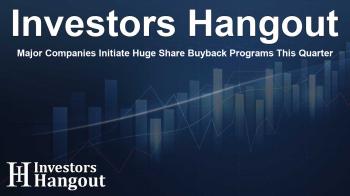Major Companies Initiate Huge Share Buyback Programs This Quarter

Massive Share Buybacks Approved by Top Corporations
Three major corporations have made headlines recently by announcing substantial share repurchase programs, demonstrating their confidence in long-term growth and value. Typically, mega-cap companies, defined by market capitalizations exceeding $200 billion, are involved in these buybacks. This article examines the specifics surrounding the buyback authorizations from these large firms, along with insights into their overall market values and the implications for their stock prices.
Merck: Committed to Growth with a Strong Buyback Plan
The first key player is Merck (NYSE: MRK), a leading global pharmaceutical company with a market cap of approximately $210 billion. Merck recently announced an additional buyback authorization of $10 billion, which raises its total buyback capacity to $12 billion, approximately 5.7% of its market cap. Merck is also maintaining its quarterly dividend of $0.81, reflecting a decent yield of 3.9% for shareholders.
Merck's key products, Keytruda and Gardasil, play a significant role in its revenue streams, with Keytruda's sales soaring by 21% last quarter. However, Gardasil’s sales faced an 18% decline primarily due to diminished demand from a sluggish economy. The company recognizes the need for innovation, targeting over $50 billion in potential sales from upcoming drugs while navigating regulatory challenges and efficient market rollouts.
ServiceNow: Embracing AI and Market Growth
ServiceNow (NYSE: NOW), a prominent technology firm specializing in cloud-based software solutions, has also stepped into the spotlight with a buyback authorization of $3 billion, increasing its total buyback capacity to almost $3.3 billion, or 1.6% of its market cap. ServiceNow has reported impressive growth, with subscription revenues rising by 21%, and a notable increase in performance obligations indicating robust future revenue.
One of the most exciting developments for ServiceNow is its focus on advanced AI tools, which have experienced a significant surge in customer adoption. The company's anticipation of contributing to the Department of Government Efficiency (DOGE) further enhances its growth trajectory, presenting immense opportunities to modernize government systems amidst the substantial investment in IT by the U.S. government.
Cisco: Positioned for Future Demand with Buyback and Dividends
The final focus is on Cisco Systems (NASDAQ: CSCO), a technology leader valued at $258 billion that has introduced a hefty $15 billion buyback authorization. With this, the total buyback capacity climbs to $17 billion, representing about 6.6% of its market cap. In addition, Cisco has increased its dividend for the 14th consecutive year by $0.01 to $0.41 per share, providing a steady yield of 2.5%.
Cisco also reported a nearly 4% increase in shares shortly following its fiscal Q2 earnings announcement. Noteworthy is its growing demand in AI infrastructure, with substantial orders indicating a promising pathway to surpass $1 billion in order value for this sector. While this growth might appear modest in the broad context of projected revenues, it signifies an important shift in the company's operational focus.
Conclusion
The decisions by Merck, ServiceNow, and Cisco to pursue extensive share repurchase programs reflect their underlying confidence and strategic foresight in navigating future market dynamics. Their ability to allocate resources effectively is likely to enhance shareholder value over time. With these buyback programs, investors can look forward to potentially improved stock performance and the continued growth of these industry giants.
Frequently Asked Questions
What is a share buyback program?
A share buyback program is when a company repurchases its own shares from the marketplace, reducing the number of outstanding shares and potentially increasing the value for remaining shareholders.
Why do companies initiate buybacks?
Companies may initiate buybacks to demonstrate confidence in their financial health, to return capital to shareholders, or to improve their earnings per share (EPS) by reducing the number of shares outstanding.
How do buybacks affect a company's stock price?
Buybacks can lead to an increase in stock prices as they reduce supply and signal to the market that the company believes its stock is undervalued.
Are dividends related to buybacks?
Yes, both dividends and buybacks are methods for returning value to shareholders, though they function differently; dividends provide immediate cash returns, while buybacks can enhance share value in the long term.
Which companies have recently announced significant buyback programs?
Recent announcements have come from Merck, ServiceNow, and Cisco, each launching substantial share buyback programs amidst their growth strategies.
About The Author
Contact Logan Wright privately here. Or send an email with ATTN: Logan Wright as the subject to contact@investorshangout.com.
About Investors Hangout
Investors Hangout is a leading online stock forum for financial discussion and learning, offering a wide range of free tools and resources. It draws in traders of all levels, who exchange market knowledge, investigate trading tactics, and keep an eye on industry developments in real time. Featuring financial articles, stock message boards, quotes, charts, company profiles, and live news updates. Through cooperative learning and a wealth of informational resources, it helps users from novices creating their first portfolios to experts honing their techniques. Join Investors Hangout today: https://investorshangout.com/
The content of this article is based on factual, publicly available information and does not represent legal, financial, or investment advice. Investors Hangout does not offer financial advice, and the author is not a licensed financial advisor. Consult a qualified advisor before making any financial or investment decisions based on this article. This article should not be considered advice to purchase, sell, or hold any securities or other investments. If any of the material provided here is inaccurate, please contact us for corrections.

